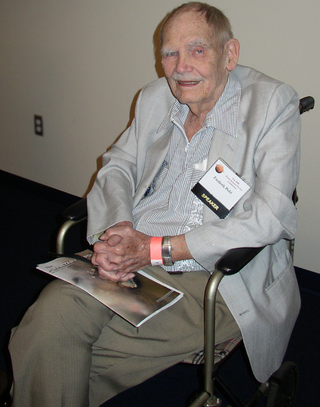
Frederik George Pohl Jr. was an American science-fiction writer, editor, and fan, with a career spanning nearly 75 years—from his first published work, the 1937 poem "Elegy to a Dead Satellite: Luna", to the 2011 novel All the Lives He Led.

Laurence van Cott Niven is an American science fiction writer. His 1970 novel Ringworld won the Hugo, Locus, Ditmar, and Nebula awards. With Jerry Pournelle he wrote The Mote in God's Eye (1974) and Lucifer's Hammer (1977). The Science Fiction and Fantasy Writers of America gave him the 2015 Damon Knight Memorial Grand Master Award.
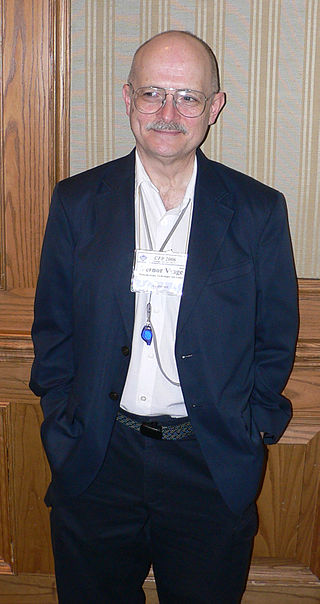
Vernor Steffen Vinge is an American science fiction author and retired professor. He taught mathematics and computer science at San Diego State University. He is the first wide-scale popularizer of the technological singularity concept and among the first authors to present a fictional "cyberspace". He has won the Hugo Award for his novels A Fire Upon the Deep (1992), A Deepness in the Sky (1999), Rainbows End (2006), and novellas Fast Times at Fairmont High (2002), and The Cookie Monster (2004).

Gregory Dale Bear was an American writer and illustrator best known for science fiction. His work covered themes of galactic conflict, parallel universes, consciousness and cultural practices, and accelerated evolution. His last work was the 2021 novel The Unfinished Land. Greg Bear wrote over 50 books in total.
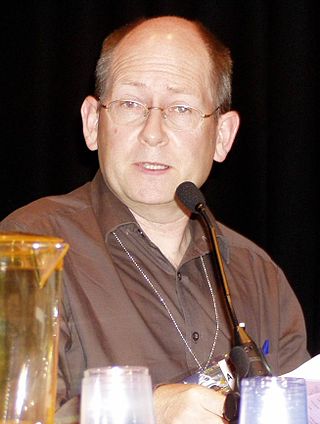
Stephen Baxter is an English hard science fiction author. He has degrees in mathematics and engineering.

Geoffrey Alan Landis is an American aerospace engineer and author, working for the National Aeronautics and Space Administration (NASA) on planetary exploration, interstellar propulsion, solar power and photovoltaics. He holds nine patents, primarily in the field of improvements to solar cells and photovoltaic devices and has given presentations and commentary on the possibilities for interstellar travel and construction of bases on the Moon, Mars, and Venus.

Charles Sheffield, an English-born mathematician, physicist and science-fiction writer, served as a President of the Science Fiction and Fantasy Writers of America and of the American Astronautical Society.

The Astounding Award for Best New Writer is given annually to the best new writer whose first professional work of science fiction or fantasy was published within the two previous calendar years. It is named after Astounding Science Fiction, a foundational science fiction magazine. The award is sponsored by Dell Magazines, which publishes Analog.

Joe William Haldeman is an American science fiction author.

Robert James Sawyer is a Canadian and American science fiction writer. He has had 24 novels published and his short fiction has appeared in Analog Science Fiction and Fact, Amazing Stories, On Spec, Nature, and numerous anthologies. He has won many writing awards, including the best-novel Nebula Award (1995), the best-novel Hugo Award (2003), the John W. Campbell Memorial Award (2006), the Robert A. Heinlein Award (2017), and more Aurora Awards than anyone else in history.

Catherine Ann Asaro is an American science fiction and fantasy author, singer and teacher. She is best known for her books about the Ruby Dynasty, called the Saga of the Skolian Empire.
Stanley Albert Schmidt is an American science fiction author and editor. Between 1978 and 2012 he served as editor of Analog Science Fiction and Fact magazine.
Howard Vincent Hendrix is an American scholar and science fiction writer.. He is the author of the novels Lightpaths and Standing Wave, Better Angels, Empty Cities of the Full Moon, The Labyrinth Key, and Spears of God. His early short stories are found in the ebook Mobius Highway.
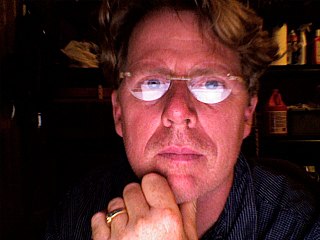
Steven Charles Gould is an American science fiction writer. He has written ten novels. His 1992 novel Jumper was adapted into a film released in 2008.
Edward M. Lerner is an American author of science fiction, techno-thrillers, and popular science.
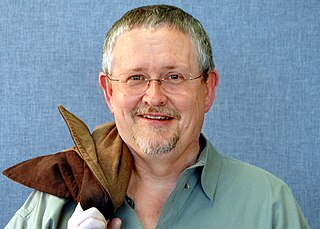
Orson Scott Card is an American writer known best for his science fiction works. He is the only person to have won a Hugo Award and a Nebula Award in consecutive years, winning both awards for his novel Ender's Game (1985) and its sequel Speaker for the Dead (1986). A feature film adaptation of Ender's Game, which Card co-produced, was released in 2013. Card also wrote the Locus Fantasy Award-winning series The Tales of Alvin Maker (1987–2003).
G. David Nordley is a science fiction writer, physicist, and astronautical engineering consultant whose fiction writing is most associated with Analog Science Fiction and Fact. His fiction is under the name G. David Nordley while his technical writing is written under the name Gerald D. Nordley. He is a fellow of the British Interplanetary Society and a senior member of the American Institute of Aeronautics and Astronautics. Gerald is an active participant in the Contact Conference, which is currently held every two years in Northern California.

Carrie Vaughn is an American writer, the author of the urban fantasy Kitty Norville series. She has published more than 60 short stories in science fiction and fantasy magazines as well as short story anthologies and internet magazines. She is one of the authors for the "Wild Cards" books. Vaughn won the 2018 Philip K. Dick Award for Bannerless, and has been nominated for the Hugo Awards.
Brian Plante is an American science fiction writer. As of 2007, he had published 49 short stories. Analog magazine has published 16 of his stories and most of the recent ones. Plante has written several sarcastic essays on writing, including the "Chronicles of the Garden Valley Writers," an account of dynamics in a fiction writer criticism group. His non-fiction has appeared in Manifest Destiny, Fantastic Collectibles, and from 1995 to 1998 as a monthly column in The New Jersey Graveline.

Nora Keita Jemisin is an American science fiction and fantasy writer. Her fiction includes a wide range of themes, notably cultural conflict and oppression. Her debut novel, The Hundred Thousand Kingdoms, and the subsequent books in her Inheritance Trilogy received critical acclaim. She has won several awards for her work, including the Locus Award. The three books of her Broken Earth series made her the first author to win the Hugo Award for Best Novel in three consecutive years, as well as the first to win for all three novels in a trilogy. She won a fourth Hugo Award, for Best Novelette, in 2020 for Emergency Skin. Jemisin was a recipient of the MacArthur Fellows Program Genius Grant in 2020.














